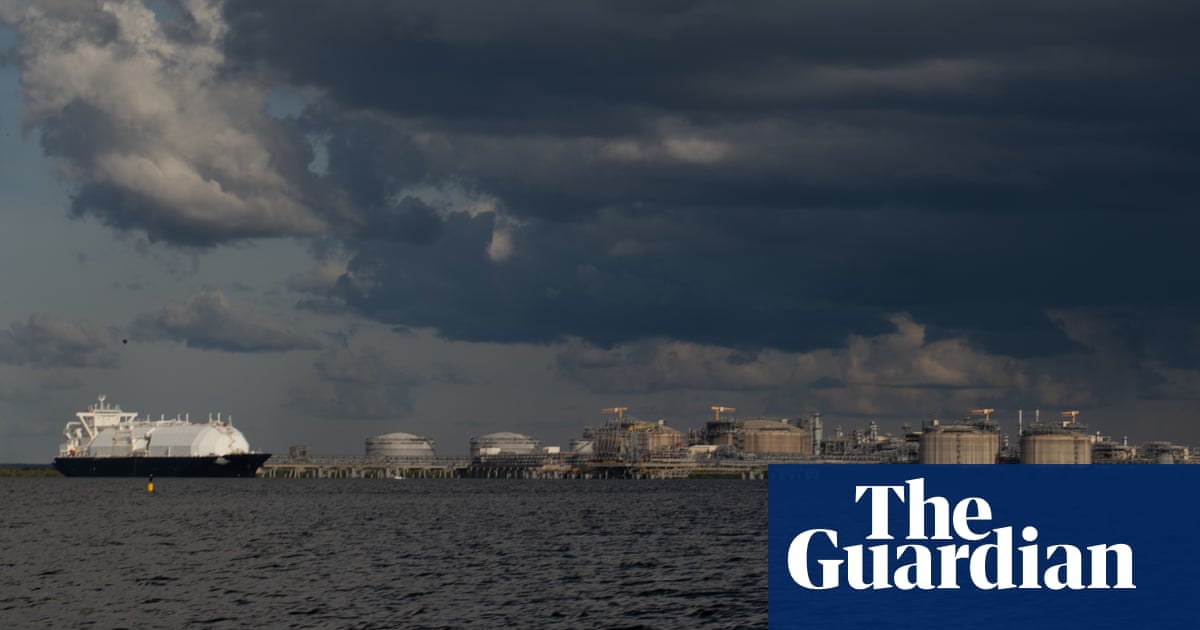
This March, North Dakota’s governor, Doug Burgum, sent a letter to the Federal Energy Regulatory Commission (Ferc) emphatically supporting the North Bakken Expansion Project, a 61.9-mile natural gas pipeline that has angered environmentalists and Native American nations alike.
Building pipelines, the 8 March letter stated, “ensures the long-term viability of our state’s oil and gas industry, preserves the quality of our environment, and allows our state’s producers to capitalize on this valuable commodity while supplying markets in need”.
Yet Burgum’s letter omitted a key detail: it was based on a template provided by Justin Dever, a senior public affairs officer for MDU Resources.
The line that claimed the pipeline would bolster both the oil and gas industry and “the quality of our environment”, was lifted verbatim from the template letter sent by Dever, email correspondence obtained through a public records request shows.
The letter sent by Burgum was one part of a broader ghostwriting campaign that saw several key legislators send pro-pipeline support letters ghostwritten by officials of MDU Resources – a subsidiary of the fossil fuel giant WBI Energy – to key regulatory agencies.
The records, obtained by the watchdog group the Energy and Policy Institute and provided to the Guardian, show that three North Dakota state legislators and a Williams county, North Dakota, commissioner signed and mailed letters to Ferc and the US army corps of engineers that reproduced word-for-word letters sent to them by MDU Resources’ political strategists.
Although the fossil fuel industry’s dominance of North Dakota politics is well-known, the records shed new light on the extent of the industry’s role in shaping what the public – and federal regulators – hear about these industries from supportive state and local officials.
The North Bakken Expansion Project pipeline would deliver natural gas from Bakken shale production sites in western North Dakota to an interconnection point with the Northern Border pipeline, which extends from western Canada to a terminus near Hayden, Indiana, and is owned by TC Energy – best known as the builder of the Keystone XL tar sands pipeline.
Ferc is scheduled to rule on the project this coming November, with MDU Resources aiming to put it in operation by late 2021.
Those politicians who reproduced an MDU Resources support letter verbatim include the North Dakota state senator Dale Patten and North Dakota house representatives Keith Kempenich and Denton Zubke, who collectively signed a letter to FERC on 20 February supplied by company lobbyist Cory Fong, a former North Dakota tax commissioner.
In another indication of the revolving door in North Dakota politics, MDU Resources’ Dever – who supplied the template letter to Burgum – was previously an official with the North Dakota commerce department.
Burgum’s office and Barry Ramburg, the Williams county commissioner who reproduced an MDU Resources letter, did not respond to requests for comment on this story. A spokesperson for MDU Resources wrote in a statement that they see nothing improper about public officials passing off letters written by the company as their own.
“Our company routinely issues information about our projects, and requests support from elected officials,” the spokesperson stated via email. “If an elected official or a member of the public chooses to reproduce that information, in part or whole, to voice their support or concern for the essential infrastructure and services our company provides, they are welcome to do so. In this instance, we appreciate Governor Burgum’s support of this critical energy infrastructure project that benefits North Dakota and the nation.”
Ted Auch, Great Lakes program coordinator of the health and safety watchdog organization FracTrack, says the ghostwriting of letters by a fracking company is the most egregious example of the industry’s dominance over a state government that he has ever encountered.
“I’ve been doing a lot of pipeline work in the past eight years, and it’s common for the industry to engage in political subterfuge,” says Auch, whose organization published a visual study this month of fracking’s environmental impacts in North Dakota. “But this really takes the cake.”
The Indigenous Environmental Network’s energy and climate campaign coordinator, Kandi White, who is from North Dakota and grew up on the Fort Berthold reservation, recalls how the oil and gas industry’s power in the state went on display before the world during the struggle concerning the Dakota Access pipeline.
In that case, indigenous people and their allies, who were attempting to stop the pipeline’s construction, were met with oft-ruthless repression by police officers working at the behest of elected state officials.
“After what happened to us at Standing Rock, this almost doesn’t surprise me – almost,” White says.
North Dakota is the US’s second-largest oil-producing state behind Texas owing to the productiveness of the Bakken Shale formation. Executives for the oil and gas industry gave over $100,000 to Burgum’s 2016 election campaign, according to North Dakota secretary of state data.












